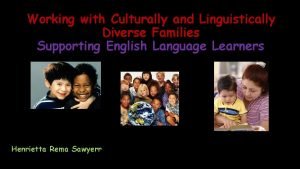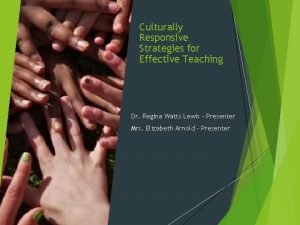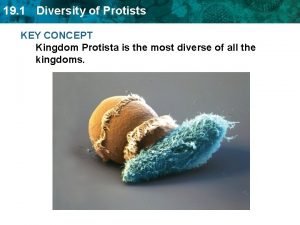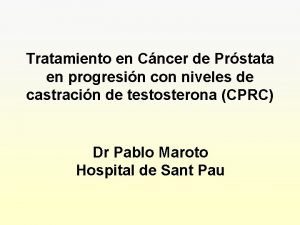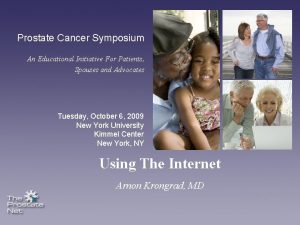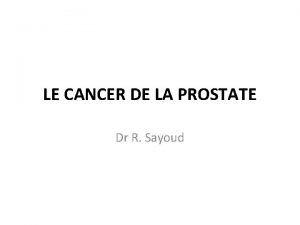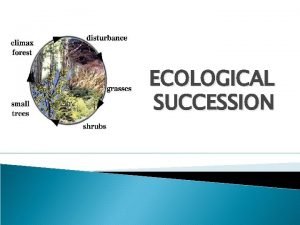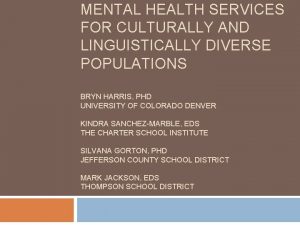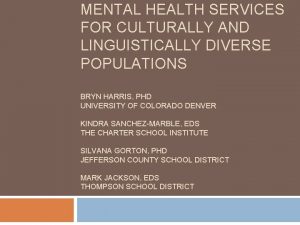Culturally and Linguistically Diverse Communities and Prostate Cancer













- Slides: 13

Culturally and Linguistically Diverse Communities and Prostate Cancer Sarah Lowe Director Cloudmaker Consulting Anthony Lowe Chief Executive Officer Prostate Cancer Foundation of Australia

In 2013 two-thirds of participants in PCFA’s Community Attitudes Survey said prostate cancer information should be available in languages other than English • It is estimated that 15%* of prostate cancer diagnoses are in men from culturally and linguistically diverse backgrounds (≈3, 300 diagnoses annually) • Yet very little is currently known about the specific prostate cancer information and support needs of their communities * NSW Central Cancer Registry data 2004 - 2008 Ten most commonly suggested languages in 2013 Survey

In 2014 PCFA decided to conduct research amongst men whose first language is Arabic, Chinese, Greek, Italian or Vietnamese Whilst it is known that CALD communities typically prefer information in their first language, prior to this pilot study there was no research specifically relating to prostate cancer and CALD communities Research Questions • What are the attitudes and experiences towards prostate cancer of men in each of these communities? • Would resources in the five languages be of value to their respective communities? • Is it culturally acceptable to present information on prostate cancer? • Is it culturally acceptable to use diagrams of the male reproductive system? • Do CALD communities require different information from the general community? The research findings were used to adapt and guide translation of three key English language prostate cancer resources

Methodology Quantitative • 256 men aged 40 and over participated in the survey (approximately 50 men from each of the five languages) • Data collected in February and March 2014 • Survey translated into five languages Qualitative • Five in-language mini focus groups (four men from each of the five languages) Distribution of participants by age and language – quantitative phase

Forty-eight (48%) of participants identified prostate cancer as the single most important disease facing men followed by heart disease (22%) Prostate cancer as the single most important health issue facing men “Yes, prostate cancer is a serious problem for everybody, not just the Italian community. ” (72 -year-old Haberfield man born in Italy, who has lived in Australia for 60 years) How much do you believe you know about prostate cancer?

Greek and Italian men have a higher self-reported knowledge of prostate cancer than Arabic and Chinese men and are much more likely to have been tested Have you ever been tested for prostate cancer? “I wouldn’t be happy about the test, but I would listen to the doctor. ” (49 -year-old Riverwood man born in Vietnam, who has lived in Australia for 29 years) How did you come to have the test?

Depending on the relationship they have with the person, discussing prostate cancer appears to be a gendered issue “Talking openly about prostate cancer is not ideal. If I go to the same club as these other men and I say I have prostate cancer, it’s not appropriate. I would like to talk about it with people who are interested, not haphazardly. ” (66 -year-old Chippendale man born in Italy, who has lived in Australia for 41 years) “Unlike Westerners, Chinese can openly talk about making money, but not making love. ” (63 -year-old Roseville man born in China, who has lived in Australia for 27 years; he was diagnosed with stomach cancer 11 years ago) Do you feel comfortable having a conversation about prostate cancer with?

Whilst many participants consume media in English, a large proportion also chose to consume information in their own language Which radio stations do you listen to regularly (at least once a week)? “We are not familiar with the Internet. For us it is better to have everything included in the leaflet – telephone numbers, whom to contact. I don’t know how to go to the Internet to get more information. ” (66 -year-old Chippendale man born in Italy, who has lived in Australia for 41 years) Which newspapers do you read regularly (at least once a week)?

Our research also shows why even men who have lived in Australia for many years may value prostate cancer information in their first language • There are people who do not speak English at all, despite living in Australia for many years • Many people who speak English still have difficulty understanding medical information in English • For men who are unwilling to speak openly about prostate cancer, translated resources enable them to obtain information without asking for help. “We need more information. Before this study, I didn’t know anything about prostate cancer. I never heard anything about it, not even in English. ” (75 -year-old Stanmore man born in Italy, who has lived in Australia for 44 years) “Probably some Italians who live here cannot speak or understand English well. Maybe they have been working and dealing with other Italian people. Therefore, information in Italian could really be of help. ” (75 -year-old Stanmore man born in Italy, who has lived in Australia for 44 years)

We found that the translated resources were very relevant to men from the respective communities. Gratifyingly, PCFA was seen as a trustworthy source of information by focus group participants “The messages are very relevant to our community. There a large number of elderly Greek men with this condition. An accurate and easy translation like this one will be very useful. ” (73 -year-old West Brunswick man born in Greece, who has lived in Australia for 48 years) “You may get a huge amount of information about prostate cancer from the Internet, but you really can’t judge whether it is true or not. However, these PCFA brochures are very trustworthy and reliable, and we have the confidence to follow the advice from these brochures. When one feels lonely and helpless, one is more likely to turn to this source. ” (50 -year-old Gladesville man born in China, who has lived in Australia for 18 years)

Summary of key findings • Prostate cancer is seen as an important health issue in all five communities • Self-reported knowledge of prostate cancer varies across the five communities with Greek and Italian men having the highest self-reported knowledge and Arabic and Chinese men the least • Depending on the relationship they have with the person discussing prostate cancer appears to be a gendered issue • To be effective, a multi-channel distribution strategy is required • The translated resources are very relevant to all five communities • The content and diagrams are culturally appropriate in all five communities i. e. a direct translation of the three English language resources is culturally appropriate

How the research findings influenced the translation The focus groups uncovered an important issue which we were not aware of because it does not arise in the general community. In many CALD communities it is thought that prostate cancer is caused by sexual misconduct and hence carries significant stigma “If someone mentioned he was diagnosed with prostate cancer, people around him would wonder if he did something wrong sexually. ” (63 -year-old Roseville man born in China, who has lived in Australia for 27 years; he was diagnosed with stomach cancer 11 years ago) As a result we included the statement “prostate cancer is not infectious or contagious. It is not possible to ‘catch’ prostate cancer. Il cancro alla prostata non è né infettivo né contagioso. Non puoi ‘prenderti’ un cancro alla prostata.

Thank you. We would like to thank Jessie Wong and her colleagues at Multicultural Marketing Management and Lew Keilar for his illustrations.
 Working with culturally and linguistically diverse families
Working with culturally and linguistically diverse families National culturally and linguistically appropriate services
National culturally and linguistically appropriate services Culturally responsive vs culturally relevant
Culturally responsive vs culturally relevant How does it move
How does it move Prostate cancer staging
Prostate cancer staging Mdv3100 prostate cancer
Mdv3100 prostate cancer Stephen ko md
Stephen ko md Laprp
Laprp Prostate cancer tnm classification
Prostate cancer tnm classification Hormonothérapie cancer prostate
Hormonothérapie cancer prostate Compare primitive communities to climax communities.
Compare primitive communities to climax communities. Culturally responsive teaching and the brain book study
Culturally responsive teaching and the brain book study Culturally deprived definition
Culturally deprived definition Vdoe culturally responsive teaching
Vdoe culturally responsive teaching
